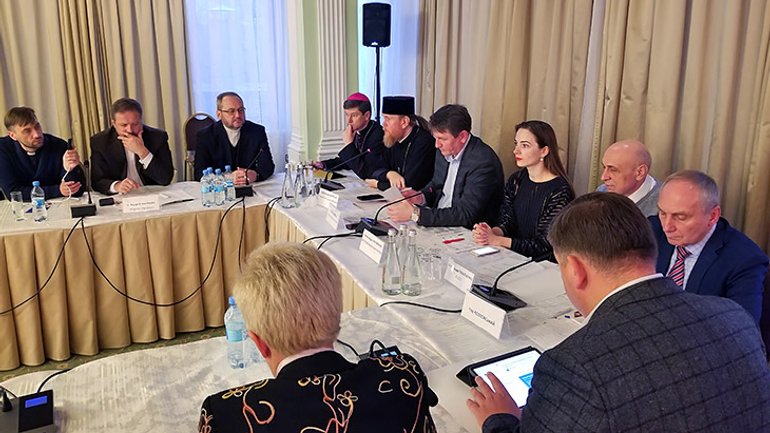Religious and public figures draft a plan to release the remaining Kremlin prisoners

Religious and public figures, as well as representatives of the authorities and international organizations, discussed further cooperation in the release of Ukrainian citizens, prisoners and prisoners as a result of Russian aggression, and their return to public life.
This issue was one of the most discussed during the Round table meeting on religious freedom in Ukraine on November 18 in Kyiv, which this year was held for the third time, the Institute of Religious Freedom reports citing ReligiousFreedom.in.ua.

Archbishop Yevstratiy, a representative of the Orthodox Church of Ukraine, stressed that it is possible to counteract the Russian false propaganda about the religious situation in Ukraine and in the occupied territories of Crimea and Donbas through the direct participation of Ukrainian religious figures in international events. The voice of the direct representatives of the religious community of Ukraine will sound convincingly along with the arguments of the representatives of the official Ukrainian authorities.
Religious scholar Ihor Kozlovsky proposed to focus not only on the problem of torture, isolation and inhuman conditions of detention, especially in prisons in the occupied territories of Ukraine, but also on the need for psychological assistance, pastoral care, assistance in employment and restoration of documents of those Ukrainian citizens who were released from Russian captivity or survived torture in the occupied territories.

Oleksandra Matviychuk, Chairman of the Board of the Center for Civil Liberties and a co-coordinator of the Roundtable emphasized that the prisoners of the Kremlin and other victims of Russian aggression hope that the abuse and inhuman treatment they experienced will not be forgotten. That is why it is extremely important to pass bill No. 0892, which would enable bringing to justice every criminal who committed crimes against humanity when it happened - without the term of limitations so that justice is restored.
Another topic of discussion was the issue of strengthening the interaction of religious and public organizations, as well as representatives of the Ukrainian authorities, with international institutions (UN, OSCE, Council of Europe, EU) to restore the violated rights of believers and religious communities in the occupied territories of Crimea and Donbas.
Separately, the Roundtable participants discussed joint activities of religious and public organizations in the area of peacebuilding. In particular, they drew attention to the problems of reintegration of residents of the occupied territories of Crimea and Donbas into Ukrainian society, reducing the polarization of society, the search for common values. Fr. Andriy Nagirnyak, Vice-President of ICF "Caritas Ukraine", and Fr. Serhiy Dmitriev, head of "Eleos-Ukraine" and Chairman of the Commission of the All-Ukrainian Council of Churches and Religious Organizations on social service, spoke about practical cooperation in this area at the local level.
The result of the meeting was the agreement of the participants of the Round table on the preparation of a joint action plan, which will include all the activities and initiatives announced during the discussion.

Oleksandr Zayets, moderator of the Roundtable and Chairman of the Board of the Institute of Religious Freedom noted: "Various external and internal challenges facing Ukrainian society, encourage cohesion and unity of various actors of civil society, among which an important role is played by religious, human rights and other public organizations"
In addition to the regular participants of the Roun table, the meeting was attended by officials of relevant authorities of Ukraine, representatives of embassies and international organizations. In total, about 70 participants took part in this event.
The Round table was organized with the support Of the center for civil liberties, the British Embassy in Ukraine and the Institute for Religious Freedom.
The next activity of the Roundtable on religious freedom in Ukraine is planned to hold a seminar for representatives of religious organizations and human rights defenders on the methodology of documenting religious crimes committed against believers in the occupied territories of Ukraine, including information security issues during this activity.









